

workshop/symposium speakers
Workshop: Online Simulations and Remote Access Visualization Tools for Science & Technology CurriculaKeynote Title: Online Simulations and Remote Access Visualization Tools for Science & Technology Curricula |
|
|
Dr. Ahmed S. Khan
Fulbright Specialist Scholar |
|
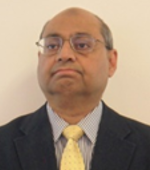
Dr. Ahmed S. Khan Fulbright Specialist Scholar, World Learning Inc. U.S. Dept. of State’s Bureau of Educational & Cultural Affairs (ECA) |
|
|
|
|
|
Speaker Biography:
Dr. Khan has more than forty years of progressively responsible experience in instruction (online and onsite), applied research, curriculum development, program and institutional accreditation, management, and supervision of academic programs at DeVry University. Dr. Khan held many academic positions that include Senior Processor, Chair, and Dean of the College of Engineering & Information, DeVry University, Addison, Illinois, USA. Dr. Khan also served as the National Curriculum Manager at the national headquarters of DeVry University, where he supervised and managed curriculum development and implementation of BSEEt & MSEE programs at 25 DeVry campuses located in the United States and Canada. Dr. Khan received an M.Sc (Applied Physics) from University of Karachi, an MSEE from Michigan Technological University, an MBA from Keller Graduate School of Management, and his Ph.D. from Colorado State University. His research interests are in the areas of Nanotechnology, New Teaching & Learning Techniques, and Social and Ethical Implications of Technology. He is the author of many educational papers and presentations. He has authored/coauthored many technical books, including the Telecommunications Factbook, and Science, Technology & Society (STS) series of books that include Technology and Society: Issues for the 21st Century & Beyond, and Nanotechnology: Ethical and Social Implications, to stimulate, inspire, and provoke awareness of technology’s impact on society. Dr. Khan is a senior member of the Institute of Electrical and Electronics Engineering (IEEE), and a member of American Society of Engineering Education (ASEE). Dr. Khan also serves as program evaluator for the accreditation agency ABET. | |
Workshop: Online Simulations and Remote Access Visualization Tools for Science & Technology Curricula |
|
|
Dr. Salahuddin Qazi
Emeritus Professor School of Information Systems and Engineering Technology State University of New York Institute of Technology (SUNYIT), Utica, New York |
|
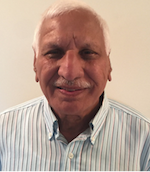
Dr. Salahuddin Qazi |
|
|
|
|
|
Speaker Biography:
Salahuddin Qazi holds a Ph.D., degree in electrical engineering from the University of Technology, Loughborough, England, UK. He is currently an Emeritus Professor and past chair of School of Information Systems and Engineering Technology at the State University of New York Institute of Technology, Utica, New York. Prior to becoming Professor Emeritus, he spent a year completing a NSF (National Science Foundation) funded project on developing instructional material for "Visualization and Manipulation of Nanoscale Components using Atomic Force Microscopy" as a Principal Investigator. He is currently involved in consulting activities for emerging technologies and higher education and have recently completed a book on "Standalone Photovoltaic Systems for Disaster Relief and Remote Areas. He is also a member of an industrial advisory board for the Engineering Technology department for the University of Maryland Eastern Shores, Princess Anne, MD. Dr. Qazi has participated as an invited speaker and presenter in several international conferences and workshops. He was a CO-PI for a US-Pakistan conference on “High Capacity Optical Networking and Enabling Technology,” which was jointly supported by the National Science Foundation (NSF) of USA and the Higher Education Commission (HEC) of Pakistan. He is recipient of several awards including the William Goddel award for research creativity at SUNYIT and engineering professionalism by Mohawk Valley Engineering Executive Committee, and forging closer relations with the IEEE Mohawk Valley section. Dr. Qazi is a life member of IEEE. | |
Workshop: Online Simulations and Remote Access Visualization Tools for Science & Technology Curricula |
|
|
Dr. Atilla Ozgur Cakmak
Grand Valley State University, Michigan |
|
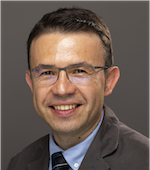
Dr. Atilla Ozgur Cakmak |
|
|
|
|
|
Speaker Biography:
Atilla Ozgur Cakmak graduated from Sabanci University, Istanbul, Turkey with a BSc degree in Microelectronics Engineering in 2003. He obtained his MSc degree in Computer Science and Electronics Engineering also from Sabanci University in 2005. Dr. Cakmak earned his PhD degree from Bilkent University, Ankara, Turkey in 2012 from the Department of Electrical and Electronics Engineering. After a brief postdoctoral experience at Bilkent University within NANOTAM (Nanotechnology Research Center), Dr. Cakmak joined Penn State in 2013 as a postdoctoral researcher to work on thin film solar cells. Dr. Cakmak got promoted to Assistant Teaching Professor at Penn State within the Department of Engineering Science and Mechanics in 2018. He taught graduate and undergraduate courses in the field of nanotechnology and nanofabrication. Dr. Cakmak is currently an Assistant Professor of Electrical Engineering in School of Engineering in Grand Valley State University, Michigan. Dr. Cakmak co-authored more than 20 papers in the leading journals in his expertise field of nanophotonics and microwave engineering. Dr. Cakmak also contributed with educational publications to the field of nanotechnology and nanoscience. He is an editor in Journal of Advanced Technological Education and a guest editor of MDPI. He has also been contributing as a reviewer to various optics/photonics, applied physics and nanotechnology themed journals. | |
Symposium: Smart Sensing for e-Healthcare Applications using IoT, AI and ML TechnologiesTitle: Challenges, Risks, and Benefits of Health Data Sharing |
|
|
M. Aslam Prof., Fmr. Rector Shifa Medical Univ, Islamabad, Pakistan |
|
|
Abstract:
|
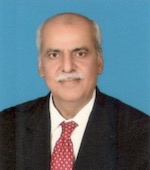
Prof. M. Aslam |
|
|
|
|
Speaker Biography:
Maj Gen. Ret’d., Prof. Dr. Muhammad Aslam, MBBS [Pb], M. Phil. [Pb], Ph.D. [London], FPAMS, FCPS [Pak], FCPS [Bangladesh], has a distinguished and long career in the field of medicine from a Physician to Professor and high-level education leadership. He has four- decades (40+ years) of active teaching and research experience in physiology at under and postgraduate levels at Army Medical College, National University of Sciences and Technology (NUST) and at Shifa College of Medicine, Islamabad. He has served from the Principal, Dean, Pro-VC to VC of several Institutions as per following abbreviated list: Pro-Vice-Chancellor, National University of Medical Sciences, Rawalpindi; Vice-Chancellor, University of Health Sciences, Lahore; Vice-Chancellor, Shifa Tameer-e-Millat University, Islamabad; Principal, Shifa College of Medicine, Islamabad; Dean, Faculty of Health Sciences, National University of Sciences & Technology, Islamabad; Principal, Army Medical College, Rawalpindi (Pakistan). | |
Symposium: Smart Sensing for e-Healthcare Applications using IoT, AI and ML TechnologiesTitle: Challenges, Risks, and Benefits of Health Data Sharing |
|
|
Shaftab Ahmed Prof., Fmr. Bahria University Islamabad, Pakistan |
|
|
Abstract:
|
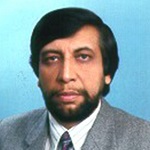
Dr. Shaftab Ahmed |
|
|
|
|
Speaker Biography:
Engr. Shaftab Ahmed, an adjunct faculty in ECE & OSE at the UNC Charlotte, USA, is a veteran Engineer, Researcher and Professor. He has served in a leading role at various institutions. Engr. Shaftab Ahmed is a former Associate Professor & Chair from Bahria University Islamabad, Pakistan and currently an adjunct faculty at the UNC Charlotte, USA. By his education and training, he is an Electrical Engineer with a focus on computer systems design / development and teaching experience of over almost four-decades. His current active research areas of interests and expertise include e-Healthcare, Telemedical Sensor Networks and Informatics for Healthcare Data Management Services in virtual hospital environment over cloud architecture, role of social networking in patient monitoring and the ubiquitous services with knowledge-based decision support solutions. In addition, he expanded his R&D work and teaching in the area of IoTs and frequently volunteers in co-organizing symposiums and workshops in IEEE HONET Conferences and also in SPIE iiScience series of International Conferences. | |
Symposium: Smart Sensing for e-Healthcare Applications using IoT, AI and ML TechnologiesTitle: Challenges, Risks, and Benefits of Health Data Sharing |
|
|
Dr. Ir. Robert Splinter
Chief Operating Officer, Chief Technology Officer Advanced Bioinformatics Ltd. UK, Manchester UK Assistant Professor (adj.), University of North Carolina at Charlotte, Charlotte, NC, USA. |
|
|
Abstract:
|
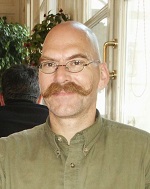
Dr. Ir. Robert Splinter |
|
|
|
|
Speaker Biography:
Dr. Splinter obtained his Ph. D., Physics and Medical Engineering, VU University of Amsterdam, Amsterdam and his Professional Engineer degree from The University of Technology Eindhoven, Eindhoven, The Netherlands. Robert has 20 plus years of electrophysiology \ cardiac rhythm management and medical device development and clinical validation including FDA and CE submissions, clearance and approvals. Dr. Splinter is a Technology Manager, Engineering Leader, with 25+ years of science and medical device technology experience using engineering and physics technologies for clinical sensing, diagnostics and treatment. Robert Splinter is also an independent research operator as the CTO of Splinter Consultants working on biometric diagnostics and signal processing as well as centralized data-acquisition with guided health technology support. | |
Symposium: Role of Emerging Technologies and Skills in Higher EducationTitle: Transforming Digital Learning in Higher Education |
|
|
Dr. Ayesha Sadaf
Assoc. Professor of Learning, Design & Technology, Department of Educational Leadership, Cato College of Education 277 University of North Carolina at Charlotte |
|
|
Abstract:
The convergence of emerging digital technologies and collaborative constructivist ideas are transforming higher education. The COVID-19 pandemic served as a catalyst for forcing educational institutions around the world to rapidly rethink teaching and learning. In this talk, I will share current practices of how digital technologies are being used in the service of transforming teaching and learning in higher education. I will situate the Community of Inquiry as a guiding framework for collaborative constructivist approaches to teaching and learning. I will elaborate three presences that are particularly important for online learning: (1) teaching presence, (2) social presence, (3) cognitive presence. Finally, I will discuss the strategic responses and structural changes that higher education institutions could implement to transform the quality of the digital teaching and learning experiences in higher education. |
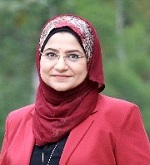
Dr. Ayesha Sadaf |
|
|
|
|
Speaker Biography:
Dr. Ayesha Sadaf is an Associate Professor of Learning, Design and Technology in the Department of Educational Leadership at University of North Carolina Charlotte. She is also Director of the Post-Master’s Certificate in University and College Teaching and Coordinator for the LDT concentration in Ed.D. Educational Leadership and Ph.D. Curriculum and Instructions. Dr. Sadaf’s research focuses on promoting a learner-centered approach to instruction using emerging technologies and innovative pedagogies in digital learning environments to support student learning. The driving question behind her research is–how to design digital learning environments using emerging technologies and instructional strategies that promote high-level learning, critical thinking, cognitive presence, collaborative learning, and student engagement. She has published her research in several leading journals in the field of instructional technology. Dr. Sadaf has more than 20 years of experience in designing, developing, and teaching courses in online, hybrid, and face-to-face formats. Her teaching experiences inform her research, ultimately demonstrating a process that emphasizes theory-into-practice. In recognition of her research informed practice, she received 2013, 2015, 2022 Distance Education Best Practice Awards from the Association of Educational Communications and Technology (AECT) and 2016 Effective Practice Award from the Online Learning Consortium (OLC). Dr. Sadaf served as the Faculty Teaching Fellow for the College of Education and Associate Quality Matters Faculty Fellow for the Center for Teaching and Learning at UNC Charlotte. She served as the President of the Division of Distance Learning, Association of Educational Communications and Technology (AECT). She also served as the Vice President of Online services for the International Society for Performance Improvement (ISPI) Charlotte. She is currently serving on the editorial board of the Journal of Research on Technology in Education and the guest editor for the Online Learning Journal. | |
Symposium: Role of Emerging Technologies and Skills in Higher EducationTitle: Emerging Technologies and Challenges for Effective Teaching and Learning |
|
|
Dr. Ahmed S. Khan
Fulbright Specialist Scholar, World Learning Inc., U.S. Dept. of State’s Bureau of Educational & Cultural Affairs (ECA) |
|
|
Abstract:
Especially focused for the Institutional Leaders, VCs, Provosts, Educators and Administrator’s; Covering modern teaching techniques and theories. A Presentation on the Pedagogy by Dr. Ahmed S. Khan, Fulbright Specialist Scholar, Chicago, IL, USA. |

Dr. Ahmed S. Khan |
|
|
|
|
Speaker Biography:
Dr. Ahmed S. Khan is a Fulbright Specialist Scholar (2017-2022). Dr. Khan has more than forty years of progressively responsible experience in instruction (online and onsite), applied research, curriculum development, program and institutional accreditation, management, and supervision of undergraduate and graduate academic programs at DeVry University, one of the largest private universities in the United States. Dr. Khan held many academic positions that include Senior Processor, Chair, and Dean of the College of Engineering & Information, DeVry University, Addison, Illinois, USA. Dr. Khan also served as the National Curriculum Manager at the national headquarters of DeVry University, where he supervised and managed curriculum development and implementation of BSEEt & MSEE programs at 25 DeVry campuses located in the United States and Canada. Dr. Khan received his M.Sc (Applied Physics) from University of Karachi, an MSEE from Michigan Technological University, an MBA from Keller Graduate School of Management, and his Ph.D. from Colorado State University. His research interests are in the areas of Nanotechnology, Fiber Optics Communications, New Teaching & Learning Techniques, and Social and Ethical Implications of Technology. He is the author of many technical papers and presentations. He has authored/co-authored many books, including The Telecommunications Fact Book and Illustrated Dictionary, Fiber Optic Communication: An Applied Approach, Mashriq-o-Mugrib Ki Mumtaz Shaksiaat (Prominent Personalities of The East and West, Feroz Sons); the Science, Technology & Society (STS) series of books that include Technology and Society: Issues for the 21st Century & Beyond (3E), and Nanotechnology: Ethical and Social Implications, to stimulate, inspire, and provoke awareness of technology’s impact on society. He is senior member of the Institute of Electrical and Electronics Engineering (IEEE), and a member of American Society of Engineering Education (ASEE). Dr. Khan also serves as program Evaluator for the Accreditation agency ABET. | |
Symposium: Role of Emerging Technologies and Skills in Higher EducationTitle: What If We All Could be Innovative! |
|
|
Dr. M. Khizar Bhutta
Sr. Engineering Manager, Whirlpool Corporation |
|
|
Abstract:
A highly-tuned culture of innovation can be our most powerful competitive edge to stay agile, relevant, and evolving. Creativity and innovative mind-set are deeply rooted in all cultures, but its definition and attributes vary across the cultures. Metaphorically, a culture of innovation is a place where something new can happen frequently and with a regularity. In an innovative culture, deeply held beliefs about what works and what does not enable innovation rather than impeding. People contemplate that creativity and innovation are only for select groups i.e., scientists who wear lab coats, design thinkers and billionaire inventors. But what if every single person became an innovator, and each team member use creative problem solving to tackle challenges and tapping inventive thinking for fueling the growth. Organizations that invite & encourage everyone into the innovative- process operate with greater agility, achieve their targets and outperform their competition results in 5.5 times the revenue growth of peers with a less inclusive approach to innovation. |
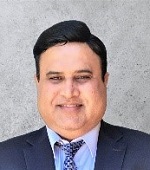
Dr. M. Khizer Bhutta |
|
|
|
|
Speaker Biography:
Dr. Khizar Bhutta., Open Innovation global leader and Sr. Engineering Manager, leads Whirlpool Corporation, USA open innovation program. Through the innovation program’s initiatives, he is leading global advanced development & innovation initiatives, in collaboration with business and technology leaders across the company for all the regions, explores emerging technologies, assesses their impact on the company’s business, prototypes and evaluates new concepts, and recommends new strategies and solutions. Khizar has 15 plus years of experience in Corporate Engineering, Product Development, Product Excellence, Manufacturing Operations, and Project Management. He has professional expertise in tactile & disruptive innovations, open innovation, consumer innovation, and cost-conscious with extensive knowledge of intellectual property management. Excellent communicator and motivator who enjoys working with people at all levels with diverse skills and backgrounds. Through his past experience, Khizar has demonstrated the ability to partner with c-level Corporate America leadership and effectively bridge the gap between business objectives and technology capabilities by deploying innovative solutions. His other areas of expertise are functional and sensorial materials, silicon photonic structures and devices, functional nanocoating, micro & nano WBG semiconductors structures and devices for smart sensing, detection, vision, artificial intelligence, solid-state display, advanced thermal management, thin-film, nano-imprinting, cold plasma, bio-inspired hybrid materials, antimicrobial technology, recycling plastic materials, and hybrid nano materials for academic and high tech manufacturing industry. Prior to joining Whirlpool Corporation in 2013, Khizar served as the high purity germanium facility lead at the University of South Dakota, USA for the research collaboration among Sanford Underground Research and Lawrence Berkeley advanced technology groups. Khizar has held appointments as a guest professor at the Center for Optoelectronics and Optical Communication, UNC Carolina, USA. He has also taught at University of North Carolina, University of South Dakota, and GIK Institute. Khizar started his carrier from Silicon Valley, CA, USA in 2006 as a lead scientist and successfully developed high power solid state light engines and deep-UV LED technology programs for their advanced design, large manufacturing production, industrial characterization, and advanced packaging for defense, bio-medical, aviation, automotive and consumer optoelectronic product applications. He currently serves on the Whirlpool Corporation technology advisory board, a cutting-edge innovation technology for product excellent. Khizar received his PhD and Postdoctoral in Optical Science and Engineering from University of North Carolina, USA where his research focused was on III-V nitrides WBG Semiconductor Photonic Structures and Devices. He has 42 patents, 150 plus publications and served as invite key-note speaker in numerous international conferences, symposiums and workshops. | |
Symposium: Role of Emerging Technologies and Skills in Higher EducationTitle: The paradigm shifts in Teaching and Learning, While Adopting & implementing Rubrics based AI and ML Technologies for Online Education |
|
|
Dr. Muhammad Manshad Satti
CEO IT Butler, Smart Solutions & EduServ |
|
|
Abstract:
In the wake of the COVID-19 pandemic situation and due to the lockdowns imposed, the conduction of online classes at Schools, college, and university levels became mandatory by the educational Authorities to Safeguard the career of the young generation. Covid-19 brought out a drastic change in the educational system not only in Pakistan but more so in the entire world. Although most of the world was not prepared for such a paradigm-shift in Teaching and Learning. The shifts in Teaching and Learning, while adopting and implementing Rubrics based Artificial Intelligence (AI) and machine learning (ML) Technologies for Online Education become a stipulation for handling such scale threats in the future. The increasing attention to Machine Learning (ML) at Schools levels and in Higher studies, especially in engineering and Medical Sciences exploring different aspects has necessitated the need to synthesize the legacy Teaching and existing Educational practices. This presentation systematically reviewed how research on ML teaching and learning has been managed, including the current area of focus, and the gaps that need to be addressed in the literature in future studies. The Popular interest in artificial intelligence (AI) has increased incredibly in recent times. Especially, ML, an essential subset of AI that has become the new engine that revolutionizes practices of knowledge discover |
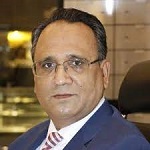
Dr. Manshad Satti |
|
Adopting such a technological system will greatly improve outcome-based learning, commonly called Rubrics in Education. A rubric is a type of scoring guide that assesses and articulates specific components and expectations for an assignment and Quizzes. Such outcome-based results can be used for a variety of assignments: research papers, group projects, portfolios, and presentations. The outcome can be measured in Analytic Rubrics, Developmental Rubrics, Holistic Rubrics, and Checklists for Assessing a variety of Courses and Student grades. |
|
|
Speaker Biography:
Dr. Muhammad Manshad Satti has received a B.E (Elec.) and M Eng. (Telecom) from the University of New South Wales (UNSW) Sydney, and a Ph.D. (Comp Engr) from Deakin University Melbourne Australia. He has over twenty-five years of industrial experience in Electronics, IT, and Telecoms. Dr. Satti was appointed as Convener for Internet Voting Task Force (IVTF) in April 2018 by the order of the Supreme Court of Pakistan for scrutinizing the efficacy and cyber resilience testing of the I-Voting application developed by NADRA. He was chief information security officer (CISO) of Australia’s largest corporate telecom where he developed telecom security policies, risk assessment, security strategies, Innovation and leadership, and complex design for dedicated hosting, co-location, e-commerce, and online businesses. During this tenure, he has contributed to several forums and worked on Information Security Management System (ISMS). He has been engaged in research and development at a leading R & D Security research Laboratory, studying Deep Packet Inspection (DPI), Lawful Interception (LI), monitoring and Analysis, (LIMA) Intrusion Detection Systems (IDS), and Data mining techniques for 3-tier security architecture. Dr. Satti authored more than thirty-five publications on ICT Security, Risk Analysis, and GRC and conducted over forty international lectures and seminars. He is a member of IEEE (USA), the Institute of Engineers Australia (MIE Aust.), and earned Chartered Engineer (CEng.) recognition. Dr. Satti is enlisted at National Professional Register (NPR) Australia in IT, Telecom, and Electrical Engineering chapters. His research interests are on Data mining, DPI, LIMA, Mobile Location Tracking, LBS Data Analytics, Telecoms signaling security, and advance Detection systems used for mitigating future DOS / DDOS attacks at Internet and Corporate networks, where ISPs and Mobile Network Operators (MNO) are most victims of such attacks. | |




 conference program
conference program


